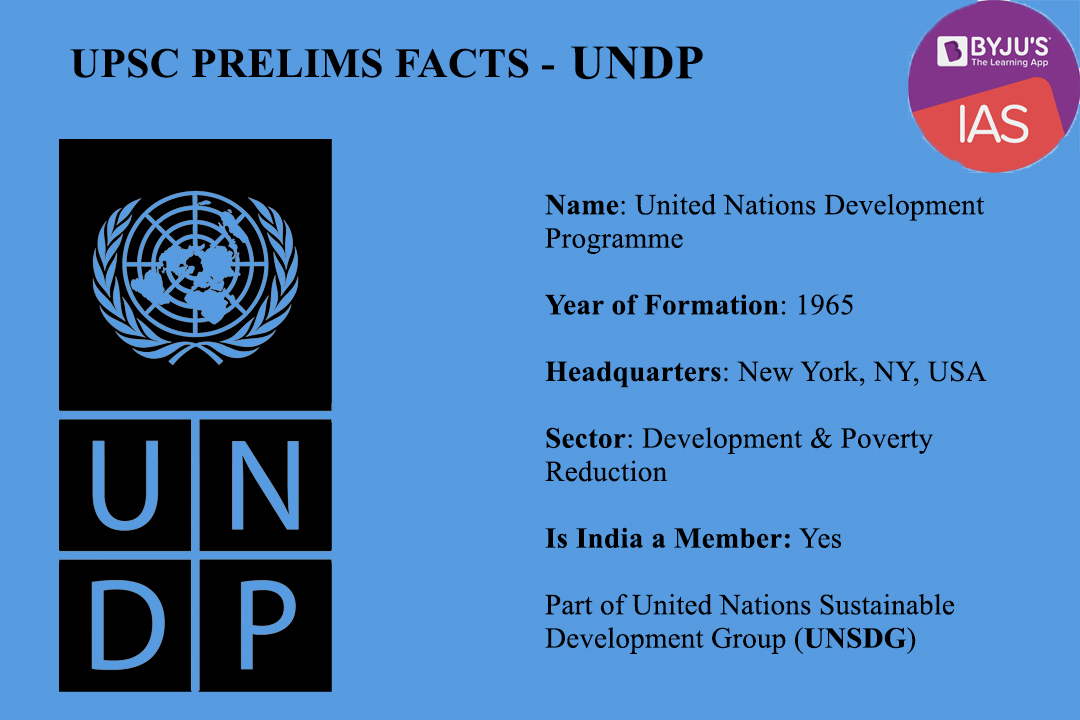The United Nations Development Programme (UNDP) is a global network for development that advocates change and connects countries to knowledge, experience and resources to help people build a better life for themselves. Such international bodies and programs are very relevant for the IAS exam. In this article, you can read all about the UNDP and its relations with India.
International organisations and groupings are an important part of the International Relations section of the General Studies paper-2 in the UPSC Syllabus.
UNDP UPSC Notes:- Download PDF Here
United Nations Development Programme (UNDP)
The United Nations Development Programme (UNDP) provides expert advice, training and grants support to developing countries, with an increasing emphasis on assistance to the least developed countries. It promotes technical and investment cooperation among nations.
- The UNDP Executive Board is made up of representatives from 36 countries around the world who serve on a rotating basis.
- It is funded entirely by voluntary contributions from member nations.
- UNDP is central to the United Nations Sustainable Development Group (UNSDG), a network that spans almost 170 countries and unites the 40 UN funds, programmes, specialized agencies and other bodies working to advance the 2030 Agenda for Sustainable Development.
- The UNDP is considered an executive board within the UN General Assembly (UNGA).
- It is headed by an Administrator.

Human Development Report
The Human Development Report (HDR) is an annual report published by the Human Development Report Office of the United Nations Development Programme (UNDP).
- The Human Development Index (HDI) is a statistic composite index of life expectancy, education, and per capita income indicators, which are used to rank countries into four tiers of human development.
- A country scores a higher HDI when the lifespan is higher, the education level is higher, and the Gross National Income GNI (PPP) per capita is higher.
To get a list of reports published by international organizations, click on the linked article.
UNDP and India
India and the United Nations Development Programme (UNDP) have worked since 1951 on various issues related to human development involving sustainable livelihoods, environment, literacy, institutional strengthening, sustainable energy and resilience.
- The Government of India aligned with UNDP to work on the India 2030 National Development Mission and build further Sustainable Development Goals (SDGs).
- The three major areas of focus for UNDP India’s country programme for 2018-2022 are:
- Inclusive Growth
- Environment & Energy
- Strengthening Systems & Institutions
- The nodal agency for all matters related to UNDP in India is the Department of Economic Affairs, Finance Ministry, GOI.
- The UNDP has offices in 6 locations in India.
UNDP’s Accelerator Lab
In November 2019, the United Nations Development Programme launched its Accelerator Lab in India to work on tackling pollution in collaboration with the government’s Atal Innovation Mission (AIM).
- Air pollution and Sustainable water management will be the issues addressed by the lab.
- What is Accelerator Lab?
- Developed by the collaboration of UNDP, Federal Republic of Germany and the State of Qatar, Accelerator Lab is an innovative initiative to find solutions for the new complex challenges faced by the world.
- India’s Accelerator Lab will be part of a network of 60 global labs covering 78 nations, that will test and scale new solutions to global challenges like climate change and inequality.
- These Labs will identify grassroots solutions together with local actors and validate their potential to accelerate development.
UNDP and Coronavirus
As per the UNDP COVID-19 Crisis response, every country needs to act immediately to prepare, respond, and recover.
- UNDP helped countries to urgently and effectively respond to COVID-19 as part of its mission to eradicate poverty, reduce inequalities and build resilience to crises and shocks.
- The next phase of the response was designed to help decision-makers look beyond recovery, towards 2030, making choices and managing complexity and uncertainty in four main areas: governance, social protection, green economy, and digital disruption.
- UNDP fully supported and expanded social protection for the poor and vulnerable with food, goods, and services, pensions for the elderly and public works, etc.
- UNDP recognized the vital importance of small, family-owned businesses, and those who depend on them, so we are working with policymakers to establish business continuity insurance for hard times.
Important International Organization that are important for UPSC exam perspective are given below-
For more such organisation aspirants can visit the List of International Organisations on the given link.
Comments